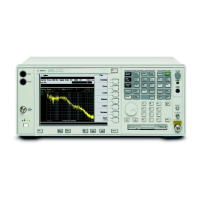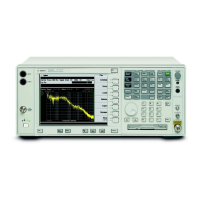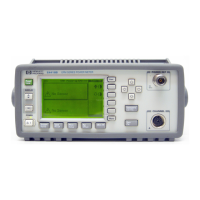114 Chapter 2
Instrument Functions: A - L
File
Instrument Functions: A - L
File Types
You can save the following types of files:
• State - A file that contains a copy of the state of the analyzer at the time the file is
saved. The settings of most analyzer functions are saved in the state files but not traces,
limits, and corrections. When a
State file is loaded into the analyzer, the analyzer is
restored to the same state as when the file was saved. Some settings are not saved in
the
State files, for example the GPIB address; these settings are called “persistent.” In
this manual, each function describes whether that function is saved in “Instrument
State” or is persistent.
• Trace - A file that contains a copy of the trace data for one or more traces. There are
two formats for trace files,
Trace + State and CSV files.
Trace + State: A file that contains the trace data and a copy of the current analyzer
state. The trace and state are stored in an internal data format (TRC), which cannot
be loaded into a PC, but can be loaded back into the analyzer. Traces can be loaded
individually or as a group. When a
Trace + State file is loaded into the analyzer the
trace data that was on the screen, when saved, is loaded into the analyzer. This
enables you to view the trace as it looked when it was saved. Because the state data
is also saved, the analyzer settings, including all the annotation on the screen, is
restored as well. To preserve the trace data, the traces contained in the saved files
are placed in
View mode (see Trace/View, page 277) so that they are not immediately
overwritten by new trace data. This means that you can save traces while making a
measurement, and later load them back into the analyzer, where you can print them
or transfer them to a computer, in CSV format, for analysis. If you wish to compare
two saved traces, place traces in view mode before saving them. This prevents the
trace from being rewritten based on a state change from subsequent loads.
CSV: A file that contains trace data in comma-separated values format (CSV,
standard PC spreadsheet format), to be read into a spreadsheet for analysis. Most
spreadsheet programs support CSV format. They cannot be loaded back into the
analyzer.
